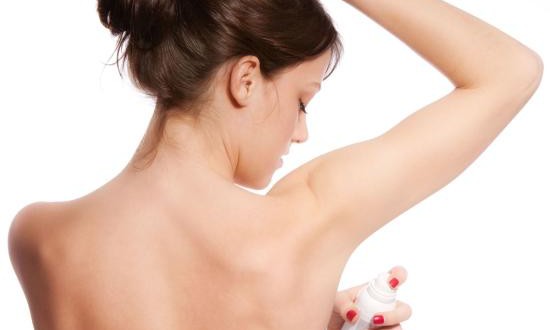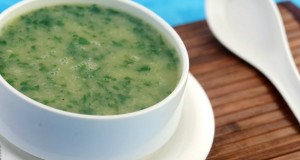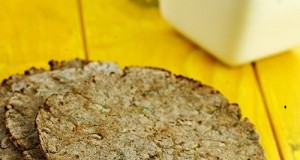 Let’s face it: A pungent body aroma isn’t going to make you the life of the party. In fact, deodorant use is way up in the United States. Older adults use deodorant around once a day, with younger adults taking a more aggressive stand against their reek risk by rolling, spraying or otherwise slathering on deodorant almost 10 times a week. It’s chemical warfare out there, and all those ingredients with the six syllable names may be spooking at least a few of us into exploring other options.
Let’s face it: A pungent body aroma isn’t going to make you the life of the party. In fact, deodorant use is way up in the United States. Older adults use deodorant around once a day, with younger adults taking a more aggressive stand against their reek risk by rolling, spraying or otherwise slathering on deodorant almost 10 times a week. It’s chemical warfare out there, and all those ingredients with the six syllable names may be spooking at least a few of us into exploring other options.
Let’s see if there are some reliable deodorant alternatives that actually work. Whether you’re concerned about health issues, want to save a little money on personal care products or need a backup plan when your deodorant applicator runs dry unexpectedly, we’ve got some old-timey preparations (and a few sly new ones) that can keep you feeling fresh and smelling sweet.
10. Stay Clean
When it comes to body odor, staying (or getting) clean is the biggest weapon in your arsenal. Here’s a brief lesson in the science of sweat: The eccrine glands, which are located on almost every part of the body, produce body cooling sweat that’s mostly water. Think of it as nature’s little air conditioning system. The apocrine glands, which are located in the armpits and in the groin (among other areas), produce sweat that performs a number of functions, one of which is to work as a kind of waste removal system that offloads microscopic bits of fat and other matter. The sweat from the apocrine glands is the big problem with body odor. Bacteria feed on the fats and other secretions, and their waste products produce that distinctive fetid aroma that announces your presence before you enter a room. You’ll notice after a vigorous workout that your sweat smells OK, not great, but at least clean and healthy. Wait a couple of hours and the bacterial feeding frenzy that ensues will transform your healthy smelling sweat into something pretty foul.
The strength of the odor a person produces depends on how much sweat his or her glands secrete as well as the number of bacteria on the skin. People with strong underarm odors carry two to three times as much underarm bacteria as other people. The best way to prevent body odor is to wash away sweat and bacteria thoroughly and regularly. Clean the underarm and groin area with water and soap, preferably a deodorant soap, at least once a day and more often if necessary.
9. Practice Good Anger Management
Anger, anxiety and excitement increase sweat production. If you’ve felt that prickling under your arms at the beginning of a big exam or when someone panic stops in the car ahead of you on the interstate, you know about stress-induced sweating. Consider learning and practicing techniques like meditation and visualization that can help you keep your cool under stressful circumstances. This is a winner on a number of levels: You’ll help control your body’s sweat response using natural techniques; you’ll save your wardrobe; and as an added bonus, you’ll be practicing a little Zen action at the same time.
8. Manage Your Wardrobe
Old sweat is smelly sweat, and nothing beats the ripe aroma of a day old T-shirt. The same goes for a suit coat with underarm stains. Get a fresh start every day by taking a shower and making sure your clothes are as clean as you are. One smart option is to install sweat guards on clothes you typically dry clean after multiple wearings. They install with Velcro fasteners, which makes them easy to remove for home laundering. You’ll smell fresher and save money on your dry cleaning bills, too.
7. Watch What You Eat
Hot weather can make you sweat, but it isn’t the only type of heat you need to watch out for. Hot foods like red peppers can make you moist, too. Some food experts speculate that the cuisines of warm weather countries rely heavily on hot seasonings for that very reason — it’s the natural air conditioning effect again. It makes people feel cooler when temperatures soar. Unless you’re trying to survive a vacation in the Kalahari, cut back on your penchant for chipotle-laden burritos and pickled jalapenos. Your friends will thank you.
While you’re reconsidering your choice of entre, you might want to ask the cook to hold the garlic and onions, too. The sulfur compounds in garlic and onions can make your sweat more aromatic than it would be otherwise, especially if you consume them in large quantities. The same goes for pungent spices.
6. Protect Your Hide
If you’ve tried deodorants and found they irritate your skin, consider washing with an antibacterial soap such as chlorhexidine (Hibiclens), or applying an over-the-counter antibiotic ointment. They’ll annihilate the bacteria on your skin, making it harder for the survivors to reproduce fast enough to cause odor problems later in the day. For added protection, sprinkle on some baking soda or talcum powder. Both do a good job of absorbing moisture from the surface of the skin. You’ll get deodorant and antiperspirant protection using a one-two punch that’s gentle but effective.
5. Do The Bath Towel Snuggle
Human skin is typically a bit on the acidic side, making it an inhospitable environment for many types of bacteria — when it’s dry. When it gets wet, that’s another story. Bacteria grow quickly on your skin when you sweat, but they start to make themselves at home if you’re just moist. Warmth helps them get established, too. Moist and warm; they love that. In short, the conditions when you get out of the shower are perfect for a bacterial bloom unless you use soap and dry off thoroughly with your trusty, fluffy towel.
4. Employ Germ Warfare
If you think you sweat more than most people, you may be right. The number of sweat glands in a person’s body can vary from around 2 million to more than 4 million. Yep, that’s million. You probably recognize the areas where you typically sweat the most — and where your sweat is the most fragrant. The underarms and groin area contain lots and lots of apocrine glands (the ones that produce fat laden sweat), so those spots are definitely candidates for a little extra attention. Think of it as added insurance against odor.
The idea here is to rinse problem areas thoroughly with an antibacterial agent that’s relatively mild to the skin. Hydrogen peroxide is one good choice. Choose a 3 percent solution, and use about a teaspoon in 8 ounces of water. Swab it on, and rinse it off. Repeat as needed. Other common household items with antibacterial properties you might also consider are diluted isopropyl alcohol, witch hazel, apple cider or white vinegar, and lemon juice. (If you have skin conditions or very sensitive skin, consult your dermatologist before making any changes to your personal care regimen.)
3. Keep Things Dry and Loose
Avoid a wardrobe malfunction by choosing clothes that will help you manage perspiration. Remember, the longer perspiration stays on your skin, the more foul smelling it will become. The last thing you want is to wear a garment that will trap moisture in. Select loose-fitting styles, and lightweight and breathable fabrics. In cold weather, wear layers you can easily put on or take off as needed.
Fabrics that wick moisture away from the skin keep the body drier and retard the growth of bacteria. Wicking is a process that redistributes moisture to the outer, dryer fabric fibers using capillary action. Fabrics with good wicking properties are usually synthetics made from a variety of polyesters or polyester microfibers [source: Ice Bike].
2. Salt Those Tootsies
While you’re reviewing your wardrobe and stocking up on antibacterial aids, don’t forget to pay attention to your feet. Keeping your tootsies locked in a pair of shoes and socks all day is providing the perfect incubator for bacteria that likes moist, dark places. It’s no wonder that the aroma wafting off your athletic socks could drop a petunia at 10 yards. To kill foot bacteria, soak your feet in salt water. Try a cup of salt for every quart of water, and don’t rinse the salt off. Let it dry in place. (If your feet begin to crack or peel, stop the salt soaks for a few weeks.)
1. Quit Smoking
Smoking can do more than ruin your health, rot your teeth and make you look a lot older than you actually are. Smoking can make you smell bad, too. When you inhale, smoke enters your lungs and works its way through your system. Tobacco smoke contains over 7,000 chemicals and chemical compounds. Some are destroying your insides, while others are eventually expelled through your skin. When you quit smoking, your body smells better — and you’ll probably live longer, too [source: CDC].
source:health.howstuffworks.com
 Mithila.net Mithila.net, Easyrecipes, Way2Foodie, Way2Foodie.com, Non Veg Recipes, Veg Recipes, Veg Recipe, Veg Recipes, Andhra Recipes, South Spicy Recipes, Vantillu, Kitchen, Indian Recipes, Telugu Recipes,
Mithila.net Mithila.net, Easyrecipes, Way2Foodie, Way2Foodie.com, Non Veg Recipes, Veg Recipes, Veg Recipe, Veg Recipes, Andhra Recipes, South Spicy Recipes, Vantillu, Kitchen, Indian Recipes, Telugu Recipes,



